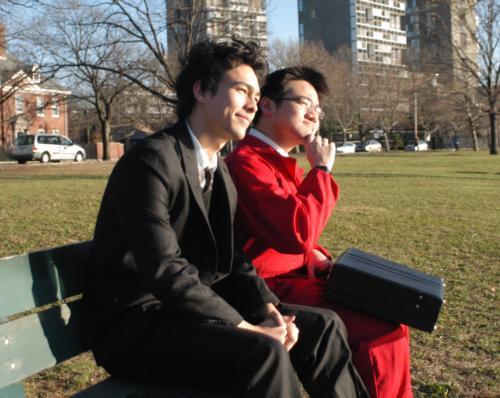
News
Harvard Grad Union Agrees To Bargain Without Ground Rules

News
Harvard Chabad Petitions to Change City Zoning Laws

News
Kestenbaum Files Opposition to Harvard’s Request for Documents

News
Harvard Agrees to a 1-Year $6 Million PILOT Agreement With the City of Cambridge

News
HUA Election Will Feature No Referenda or Survey Questions
Hwang Promotes Laissez-Faire Council

Contrary to what their blood-red campaign posters demand, Undergraduate Council presidential candidates Tim R. Hwang ’08 and Alexander S. Wong ’08 do not actually want to “kill the UC.” Rather, they want to wound it severely.
The offbeat presidential candidate and his armchair-theorist running mate say that if elected, they would eliminate the UC’s role as middleman between students and the administration and transfer decision-making power to undergraduates.
Neither Hwang nor Wong have had any UC experience, but they embrace their outsider status.
“Our solution is to change the system bottom-up,” Wong says.
A LAISSEZ-FAIRE UC
In line with his vision of expanding student freedoms, Hwang says that he would institute a “laissez-faire system,” where undergraduates—not council members—would decide which student groups get UC funding.
Hwang says groups would post their grants online, and students would cast their votes for which organizations should receive funding. The UC would then grant funding to groups with the most votes.
“The votes [would be] a recommendation, not a constraint,” he says, although the UC would consider those votes “a very strong mandate from the people.”
Hwang says, for example, that the UC’s decision last semester to increase funding for residential Houses that do not charge member dues gave council members too much leverage in determining which Houses get funding.
Under Hwang’s vision, the UC would distribute money to House Committees (HoCos) proportional to each House’s population, while still allowing HoCos to charge house dues.
Hwang also says that UC members would not speak for students, but would be “a secretarial system,” acting as a liaison between students and administrators.
‘A MATCH MADE IN HEAVEN’
Over pumpkin pancakes at the International House of Pancakes (IHOP) last week, Hwang and Wong reminisce about the ice cream social during Freshman Week, where they first met.
“It was a match made in heaven,” Hwang says.
Hwang, an Economics and Government joint concentrator in Eliot House, has devoted much of his time to Harvard Free Culture, which advocates less restrictive intellectual property policies.
“Cultural space used to be public,” Hwang says, adding that even the song “Happy Birthday” is copyrighted.
He has also worked on the Dance Conspiracy project—where participants dance together to music broadcast over handheld radios in various Harvard locales—and he hopes to start his own college radio music label.
Wong, an Economics concentrator in Quincy House, has dabbled in different extracurricular pursuits in his Harvard career, with stints on the sailing team, the Harvard College Economics Review, and the crew team. This year he is in the Harvard-Radcliffe Kendo Club and plays French horn in the Harvard University Band, although he jokes that “‘play” is a euphemism.”
The former Social Studies concentrator still lapses into moments of social theorizing when he talks about his UC campaign.
“The ideal government would be a person who knew everything about everyone perfectly. That doesn’t exist,” he says. A government “should allow people to do what they like to do, rather than have someone top-down say ‘you should do that.’ ”
“This campaign is kind of a culmination of three years here. It’s social critique as well as being a campaign,” Hwang says.
THE TWO HARVARDS
Hwang has developed a social critique of his own about Harvard, saying that there is a division in the Harvard undergraduate population between insiders and outsiders.
In a document called “The Two Harvards Manifesto,” Hwang writes that the insider is “the ambitious, the socialite, the gladhandle.” The outsider is “everyone who’s not that,” he says.
Hwang adds that there is a perception on campus that the UC is made up mostly of these insiders, who are “very smarmy, very ambitious, not very authentic type of people,” a stereotype he says he believes is true.
“This is a product of my experience at Harvard, a product of me talking to people, observing the behavior of the UC itself,” he says.
He points to the average voter turnout in this year’s UC House representatives election, which was under 40 percent, as evidence of the alienation among the voters who fall into the “outsider” category.
Hwang says he sympathizes with members of this category since he describes himself as “a person who does strange things.”
He describes one particular “art project” he did during his freshman year, in which he displayed a huge picture of an eye on his Canaday dorm window and shouted, “I am an eye” at passersby.
‘THREATENING THEIR JOBS’
Despite reveling in catching people off-guard, Hwang says that the other candidates have reason to see him as a serious contender.
“At UC meetings, we were politely asked to drop out,” he says. Because this year’s candidate pool is so large, Hwang says that the votes among the top contenders could be split.
“One in a field of six makes us extra dangerous, although the little guy,” he says. “We’re threatening their jobs.”
Want to keep up with breaking news? Subscribe to our email newsletter.
Related Articles
Most Read
- Harvard’s Hyperfixation on Israel Is Academically Unserious
- Harvard Police Union Overwhelmingly Votes No Confidence in HUPD Chief Clay
- Trump Administration Conditions Harvard’s Funding on Eliminating DEI, Restricting Protests
- House Door Boxes Elicit Backlash Over Conservative Student Publication
- Facing Trump’s Ultimatum, Harvard Has No Easy Choices
